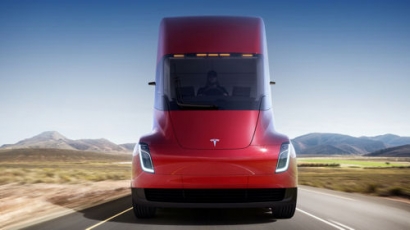
"We believe electric trucks will be most beneficial on local and drayroutes, and we look forward to utilizing this new, sustainable technology," John Roberts, president and chief executive officer at J.B. Hunt, said in a statement.
Tesla unveiled the truck before a packed crowd of thousands, calling it “industry-disrupting.”
The Tesla Semi can accelerate from 0-60 in 5 seconds, without cargo, and 20 seconds with a full 80,000 lb. load, more than twice as quick as a traditional diesel truck. The Semi can also traverse a 5% gradient at 65mph, compared to 45mph for diesel trucks. This is all powered by the truck’s four independent electric motors says Musk. “You can lose two of the four motors, and it will still keep going.”.
“Overall, the Semi is more responsive, covers more miles than a diesel truck in the same amount of time, and more safely integrates with passenger car traffic,” the company said in its official announcement. Tesla also highlighted the fact that the Semi benefits from the regenerative braking that can recapture 98% of braking energy into the battery.
Tesla claims that the semi will cost 20% less per mile compared to Diesel trucks, costing $1.26/mile versus $1.51/mile. Musk announced convoy technology that will further reduce the cost per mile driven for the Tesla Semi, even beating the cost of rail-based transportation, saying, “Tesla Semi can also travel in a convoy, where one or several Semi trucks will be able to autonomously follow a lead Semi.”
While Tesla didn’t unveil the price of the truck, Musk noted that the semi-truck is expected to save operators $200K on fuel alone over 1 million miles. This resonated with fleet owners as Jerome Guillen pointed to some important guests at the event, stating that they had “placed a lot of reservations”. First production of the Tesla Semi is expected sometime in 2019.
For more information: Tesla
Photo courtesy Tesla

